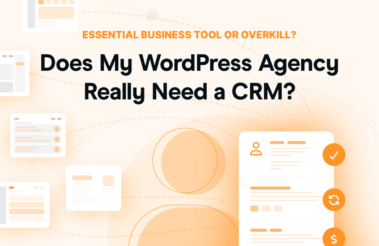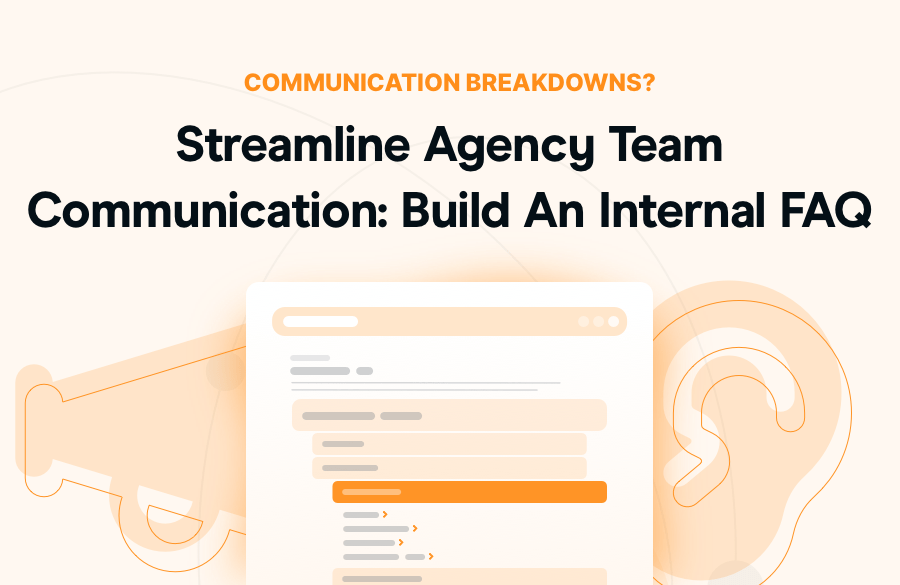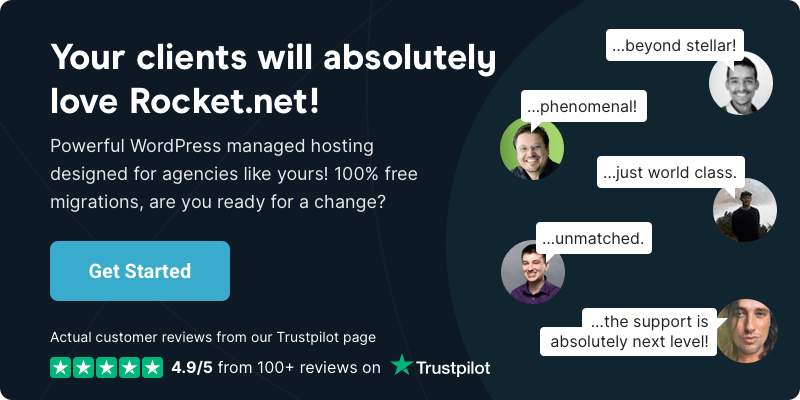
Does My WordPress Agency Really Need a CRM?
- •
- 4 min read

It’s easy to forget that many of our team members are knowledge holders. Meaning, processes, procedures, and protocol lives at their discretion. If you’re an agency of one, you know this. Once you start adding vendors, employees, and think about scaling your business, it’s important to download this information from other people’s brains. You can easily do that with an internal FAQ system.
Building an internal FAQ system streamlines team communication by centralizing the knowledge scattered across Slack, emails, and individual members. FAQs reduce onboarding time, ensure support consistency, and facilitate smoother developer handoffs.
Want to start right? Collect existing questions, categorize them, choose an accessible platform, assign ownership, and prioritize searchability. Regular updates and collaborative input keep your FAQ valuable over time.
Team communication is a must-have, not a nice-to-have. For WordPress agencies and freelancers juggling multiple client sites, content launches, plugin updates, or even absent team members, the ability to access and share knowledge quickly can directly affect performance, client satisfaction, and employee morale.
An internal FAQ or knowledge base acts as your agency’s one source of truth. It ensures that designers, developers, marketers, and support staff can access consistent information, regardless of time zone or project load.
Everyone struggles with fragmented knowledge. Critical information is often locked away in Slack threads, lost in inboxes, or known only to one or two “go-to” people. When someone’s out of office — or leaves entirely — that information often goes with them.
Panopto reports that 42% of valuable company knowledge is unique to the individual who knows it. And the cost? Lower productivity, slower onboarding, and higher frustration across the board.
“We found that companies suffer from unshared knowledge in two ways: first, in making employee transitions less efficient, and second, in making day-to-day work less productive.”
Panopto
For WordPress agencies, where work ranges from hosting and maintenance to marketing and support, speed and clarity are everything. Whether you’re onboarding a new content manager or responding to a client bug report, every minute spent searching for an internal process or plugin setting is time lost.
An internal FAQ helps with:
Think about it this way: you document your code, don’t you? Document your company policies, procedures, and protocols, too.
<!– Your future self thanks you for commenting on your code. –>
“One agency documented its onboarding and development workflows in a shared FAQ, reducing handover time between developers by over 30%.”
collabwriting.com
Honestly, keep using it. Take the time to update the FAQ wiki/GoogleDoc/et al. You’ll thank yourself later.

Treat It Like a Product:
Just like your client sites, your internal knowledge base needs care, feedback, and iteration.
“Working together is easier with an open, empathetic, and proactive communication style. We’re not all born communicators.”
Rocket.net – Agency Communication Guide for Clients That Need ‘Simple‘ Changes
Whether you run a WooCommerce store or a client’s coaching blog, adding FAQs is one of the smartest moves you can make. Not only does it keep your visitors happy (and on your site longer), but it also saves you from repeatedly answering the same emails. Win-win!
Rank Math and Yoast offer FAQ blocks for your website’s SEO schema advantage; that’s a must-have. If you are looking for a more robust WordPress FAQ plugin, here’s a quick rundown of our favorites, plus some friendly advice to help you decide:
If you want a flexible, feature-rich plugin that works with any WordPress theme, Ultimate FAQ stands out. It offers a drag-and-drop builder, unlimited FAQs, categories, tags, plus responsive accordion layouts. It’s also SEO-friendly, supports WooCommerce, and lets you customize the look to fit your brand. The free version is robust, and the premium upgrade adds even more power.
Do you prefer a simple, visually appealing accordion style? Accordion FAQ is easy to use and lets you create unlimited accordions. It comes with plenty of design options. It’s perfect if you want a straightforward, mobile-friendly FAQ section that looks great right out of the box.
For most websites, Ultimate FAQ is the best all-rounder: it’s flexible, powerful, and easy to use.
If you want something lightweight and visually simple, try Accordion FAQ.
No matter which you pick, adding a quality FAQ section will boost your site’s user experience and help reduce repetitive support questions. Take it out for a spin, and see how many fewer calls you need to field.
An internal FAQ won’t solve every communication problem, but it will give your team a stronger foundation. It reduces bottlenecks, scales your expertise, and helps every project run smoother — whether you’re five freelancers in different cities or a growing agency with multiple departments.
Even better? It frees up your team to do their best work, without chasing down the same answers week after week.
Grow your business with lightning-fast, secure, and optimized websites that are easy to set up & manage. Top-tier agencies and online businesses choose Rocket.net as their trusted managed WordPress hosting provider – why shouldn’t you, too?
